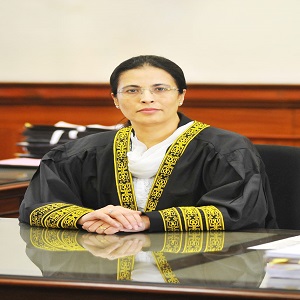ISLAMABAD: Justice Ayesha A. Malik has been removed from the seven-member constitutional bench assigned to hear the Intra-Court Appeal (ICA) filed by the federal government challenging the Supreme Court’s decision that deemed the trial of civilians in military courts unconstitutional, The News reported.
The three-member committee responsible for the constitutional bench — constituted under Article 191A(4) of the Constitution — released the minutes of its third meeting held on November 13. The meeting, chaired by Justice Aminuddin Khan, included Justice Jamal Khan Mandokhail, Justice Muhammad Ali Mazhar, and the Supreme Court registrar.
According to a press release from the Supreme Court’s Public Relations Department, the committee discussed several measures aimed at improving efficiency and transparency in case management, particularly for constitutional matters.
The bench noted that Justice Ayesha Malik, as a member of the earlier bench whose decision is now under challenge, could not participate in the hearings for the appeals. As the original ICAs were heard by a seven-member bench, the committee resolved to approach the Judicial Commission of Pakistan to ensure the constitutional bench is promptly constituted for this case.
Key Decisions and Measures:
- Drafting Rules for the Constitutional Bench:
The registrar was instructed to draft rules for regulating the practice and procedures of the constitutional bench. The draft will be prepared in consultation with Justice Muhammad Ali Mazhar and reviewed by the committee for approval. - Expediting Pending Appeals:
To address pending appeals under Order V Rule 3 of the Supreme Court Rules, 1980, the committee directed the categorisation and compilation of cases within a week. Five chamber appeals are to be fixed daily for hearing before each committee member. - Judicial Assistance:
To manage the increasing workload, the committee recommended requisitioning a competent civil judge to provide judicial support to the bench. - Case Identification and Tracking:
The committee approved using a green stamp marked “Constitutional Bench” on relevant case files and integrating this tagging into the court’s IT-based Case Flow System. - Standardising Documentation:
Order sheets for constitutional matters will now include standardised headings, specifying the jurisdiction type—whether original, appellate, or advisory. Cases filed under Article 191A will also be explicitly marked as belonging to the Constitutional Bench. - Paper Books and Urgent Hearings:
Parties filing cases under the constitutional bench must submit at least seven paper books. Until procedural rules for urgent cases are finalised, applications for early hearings will be placed before the committee to prioritise pressing matters. - Jurisdiction and Case Allocation:
The Supreme Court will retain exclusive authority to transfer cases under Article 186A of the Constitution. Only cases under Article 199 that involve significant constitutional questions or substantial legal issues will be referred to the constitutional bench, while other cases will be heard by regular benches.
The committee reiterated its commitment to enhancing procedural clarity and expediting hearings to ensure the smooth functioning of the constitutional bench.










